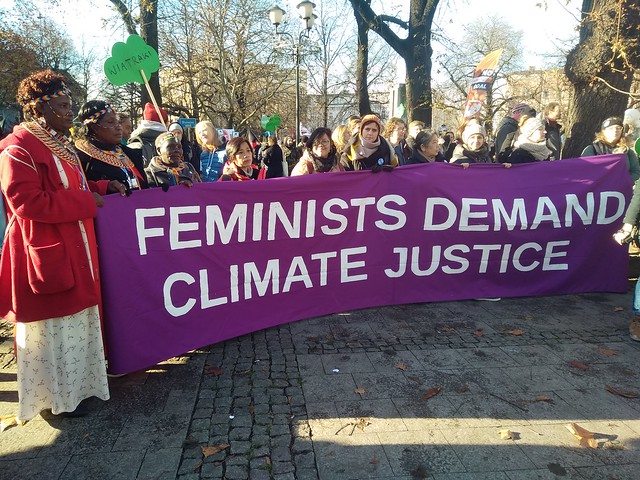Not without us! Climate justice and gender justice in international climate politics
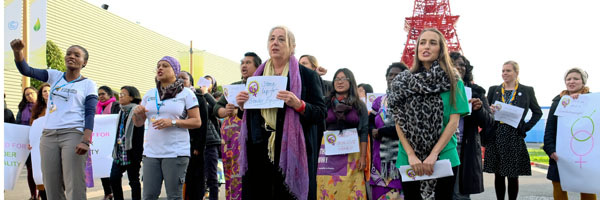
"Not without us" was launched in 2017 to promote the integration of gender justice in international climate politics and within the global climate justice movement.
Selected activists and gender experts from environmental groups and women’s organisations, primarily from the Global South, will be supported in their attempts to connect local struggles for climate and gender justice with the UNFCCC process, enabling networking with other actors.
The project Not without us! Climate justice and gender justice in international climate politics is supported by Rosa-Luxemburg-Stiftung
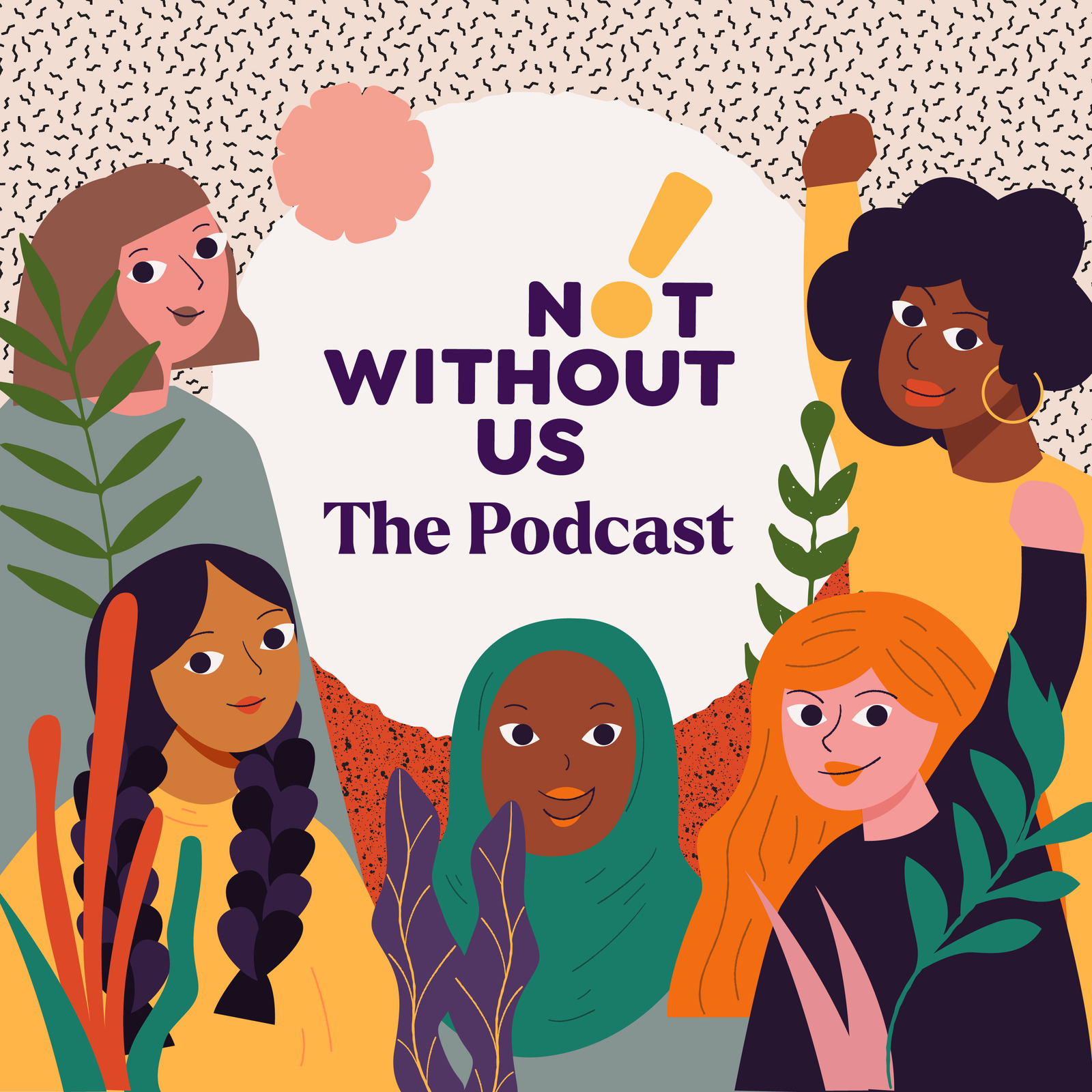
Check out the "Not without Us!" Podcast
“Not Without Us!” promotes the integration of gender justice in international climate politics and within the global climate justice movement by connecting and amplifying local struggles and resistance. Not without Us! is implemented by the organisations LIFE e.V. and GenderCC in cooperation with the Critical Geography Collective Ecuador, Gender CC South Africa, Solidaritas Perempuan and financed by the Rosa Luxemburg Foundation with funds of the federal ministry for economic cooperation and development of the federal republic of Germany. medium.com/notwithoutus
The Not Without Us! podcast is produced by Studio Lärm, www.studiolaerm.net
Link to all episodes:
Spotify: https://open.spotify.com/show/3aIoIPCKg7bh0rf4wIwJD7
Deezer: https://www.deezer.com/us/show/3120582
Podcast.de: https://www.podcast.de/podcast/2610690/not-without-us
List of episodes
#1 Why we call ourselves feminist climate activists
We are a very diverse group of feminist climate activists. We come from different countinents, identify as queer, African, People of Colour, Indigenous and white. But despite our very diverse backgrounds, we all experienced the same patriarchal structures. In this talk, we share what it means for us to be a feminist and explore the story behind our feminisms. Further, we talk about what it means to look at climate change through an intersectional feminist lens. We cannot tackle the climate crisis without making the nexus to our unjust societal and economic structures.
Portuguese: Neste episódio, a Taily e Isadora apresentam o trabalho do projeto Not Without Us. Elas convidam-nos a pensar em novas perspectivas sobre a justiça climática e porquê que uma luta feminista pela justiça climática é melhor travada em conjunto e em solidariedade.
English: In this episode, Taily and Isadora introduce the work of the Not with us! Project. They invite us to think about new perspectives on climate justice and why a feminist struggle for climate justice is best fought together and in solidarity.
#3 ¿Qué es la justicia climática feminista para nosotras? What is feminist climate justice for us?
Español: En este episodio Gabriela Ruales y Melissa Moreano del Colectivo de Geografía Crítica del Ecuador conversamos sobre la necesidad de identificar con claridad las causas de la crisis climática para evitar caer en falsas soluciones y luchar por la verdadera solución: transformar el sistema de producción y consumo capitalista imperante, sostenido en estructuras patriarcales y en un patrón de poder colonial racista.
English: In this episode in spanish, Gabriela Ruales and NwU! member Melissa Moreano from the Colectivo de Geografía Crítica del Ecuador talk about the need to identify the causes of the climate crisis in order to avoid falling into false solutions and to fight for the true solution: to transform the prevailing capitalist production and consumption system, sustained in patriarchal structures and in a pattern of racist colonial power.
#4 Decolonizing feminism and queering the climate movement
In this episode we talk about our perspectives on decolonial feminism and ways to break these structures of exploitation. We share our thoughts on how to untangle eurocentric feminisms, hear about the powerful idea behind communitarian feminism and the necessity of hearing the voices of the queer community. Towards the end of our talk we critically look at the nature of te UN climate talks andthe need to decolonize this process as well.
#5 Keadilan iklim adalah isu Feminis - Climate justice is a Feminist issue
Bahasa: Di episode kali ini, Dinda Nuur Annisaa Yura, yang berasal dari Jakarta, Indonesia, berbagi mengenai keterkaitan dan hubungan antara keadilan iklim (climate justice) dan keadilan gender (gender justice). Dinda menjelaskan bagaimana untuk mencapai keadilan iklim (climate justice) dan mengakhiri dominasi dan hegemoni korporasi yang merusak lingkungan, kita juga harus beralih dari hubungan patriarki menuju keadilan untuk semua.
English: In this episode in bahasa, Dinda Nuur Annisaa Yura, who is based in Jakarta, Indonesia, talks about the interlinkages between climate justice and gender justice. Dinda explains that to achieve climate justice and end the domination and hegemony of corporations that destroy the environment, we also have to shift patriarchal relations towards equality and justice for everyone.
#6 Falsas soluciones a la crisis climàtica - false solutions to the climate crisis
Español: En este episodio Ivonne Yánez de Acción Ecológica y Melissa Moreano del Colectivo de Geografía Crítica del Ecuador y membro de Not Without us, conversamos sobre las falsas soluciones al cambio climático, ¿qué son? ¿cómo reconocerlas? ¿cuáles son sus impactos en las mujeres? También hablamos sobre las verdaderas soluciones al cambio climático, acciones que llevan a cabo los pueblos del mundo.
English: In this episode in spanish, NwU! member Melissa Moreano from the Critical Geography Collective of Ecuador and Ivonne Yànez from Accion Ecoloògica talk about what we call "false solutions" to the climate crisis. They explain what they are, how to recognise them, what their impact on women ist, and what real solutions to climate change are: actions carried out by the people of the world.
In this episode we share our views and thoughts on the international climate conference in Glasgow: the COP26. We talk about what is at stake at this year's COP - from finance, market-mechanisms and human rights issues to education. We also share how difficult it has been to organise participation at the COP due to vaccine inequality, travel and visa restrictions and challenges to an inclusive COP - especially for countries from the Global South. To learn more about our project and our views on gender justice in international climate negotiations, check out our webpage https://medium.com/notwithoutus
#8 Kadambari - towards a green and clean planet
NwU! member Babitha works in the field of education and sustainability in Kerala, India. In this episode, Babitha shares the story of Rajasree and her education project "Kadambari"in Kerala. Kadambari ist an environmental education projects which connects children to local knowededge and ecology. It nurtures nature conservation-conscious minds in children through teaching them love for nature.
Check out our new colloborative storytelling page on medium!
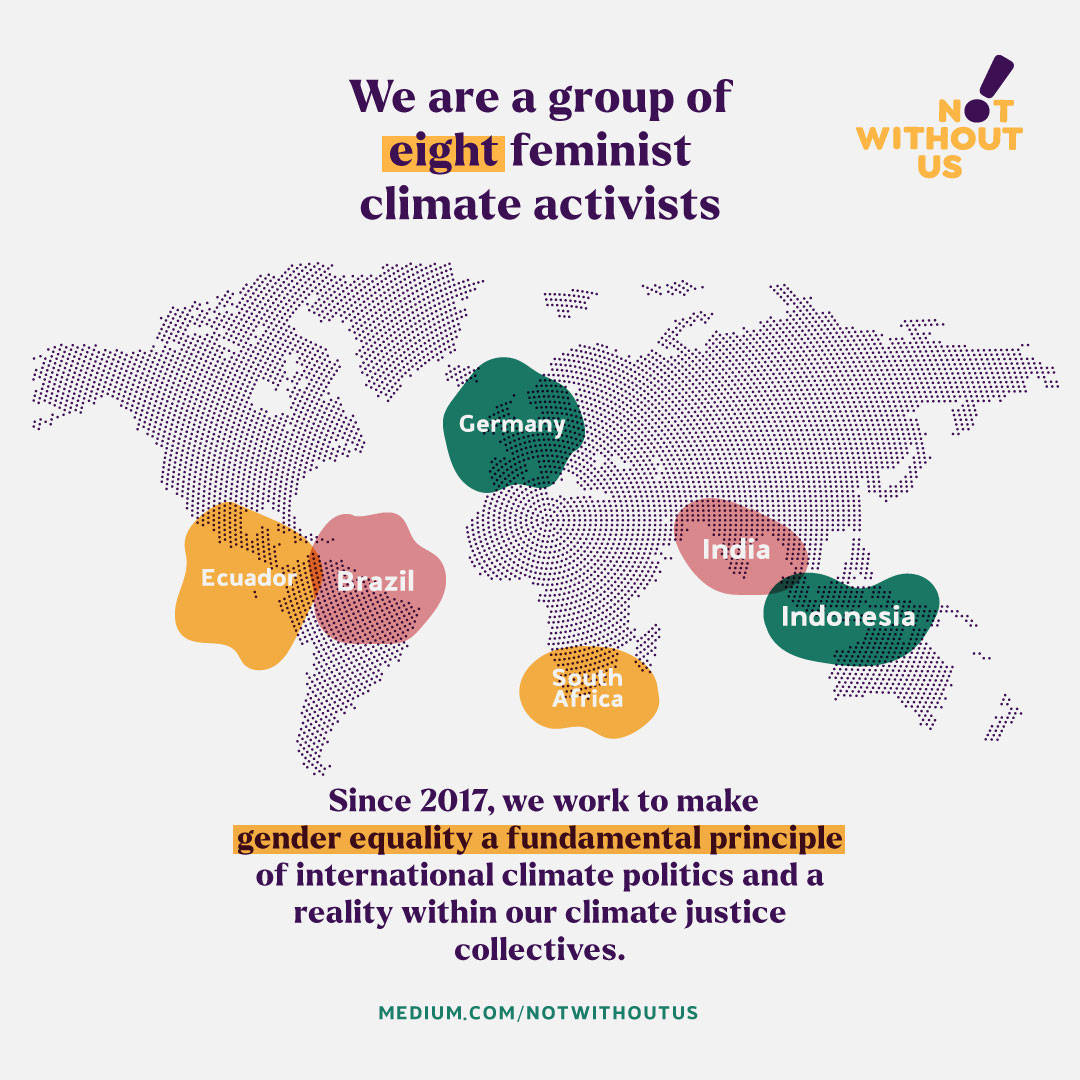
Our international project "Not Without Us!", together with the Women and Gender Constituency, launched a new collaborative medium page. The page is meant to be a virtual storytelling platform for individuals and collectives engaged or connected to activist and advocacy networks striving for gender and climate justice anywhere in the world. We warmly invite feminists, gender experts, queer and non-binary activists, Black, Indigenous and Womenx of Colour from all around the world to share their individual or collective story on climate and gender justice in our page. This can be a story of success and joy, it can be about portraying womxn leadership in local climate justice struggles, a story about losses or injustices or any other stories on local practices and climate change realities. This medium platform aims to host written stories just as much as audio pieces, videos, images, pictures or any other art work, in any language.
Check out our #WomensMonth postcard series featuring amazing feminist climate activists!
Check out the amazing feminists climate activists from around the globe who are part and inspire our #NotWithoutUs project. Illustrations by Ellena Ekarahendy.
Webinar "Not without us – feminist voices in climate justice struggles"
On November 27th, we promoted a special event, as part of the 2020 UNFCCC Climate Dialogues. It included feminist voices from around the world and how they raise feminist issues in their local climate justice struggles or in their advocacy work. The event was promoted by our project team. The full event can be watched on YouTube.
Gender Justice Advocates at COP25 in Santiago de Chile and Madrid
The Not Without Us! team was in bold presence in Santiago de Chile, participating at the Cumbre de los Pueblos, and Madrid, at COP25 and the Social Summit for the Climate.
Prior to COP25, the project team held a webinar to prepare climate and gender activists on the main issues at stake during the session in Madrid.
In 2019, our international team of climate and gender activists from Fiji, Ecuador, South Africa, India and Indonesia produced local stories (EN and ES) of real people, especially women and LGBTQI*, affected by the climate chaos. The stories were collected in their own countries and communities. We want to give space to these voices and make sure such stories are heard and considered both within the climate negotiations and civil society spaces!
In Santiago, Melissa (Ecuador) presented each of these stories during the Cumbre de los Pueblos. And in Madrid, Ndivile (South Africa), Tamani (Fiji), Isadora (Brazil), Patricia and Nanna (Germany) also spread the local stories in several opportunities, including an official side event held at the UNFCCC conference.
Below and on the right hand side under downloads are the local stories produced by our project.
Makana: women in the frontlines fighting the extractive industry and climate change (Ecuador)
Women from the Ecuadorian Amazon fight the oil industry nationally and internationally while reconstructing their lives and communities and heal the land polluted by oil. In the cities, urban women support the fight of the Amazonian women and work for climate and feminist justice. They all fight climate change on the ground. A series of short videos show the life stories of indigenous, peasant and urban women in Ecuador. Concept by Melissa Moreano, Critical Geographies Collective, Ecuador.
Women Rising: Voices from Kerala (India)
In August 2018 and September 2019, the State of Kerala in India was battered by the worst flood in a century. The floods took away people’s lands,livelihoods, and lives but was met with extraordinary solidarity amongst people and the State. This short film (parts 1 and 2 below) explores women's lived realities after the floods from the communities in Trivandrum and Alappuzha, and their initiatives as response measures for environment and climate breakdown. Concept by Shradha Shreejaya, India.
Not Without Us! Women, Sexual & Gender-Diverse People Experiences (Fiji)
The "Not Without Us: Women & Sexual & Gender-Diverse People Experience" documentary (parts 1 and 2 below) shares insight into the lives of Fijian Women & LGBTQI+ community in relation to climate preparedness and response. As active agents of change, the community shares strategies and interventions that builds their capacity and resilience to address climate change injustices. Concept by Tamani Rarama, Fiji.
Women's Struggle in the Middle of Climate False Solutions (Indonesia)
In 2019, Indonesia faced forest and land fires, in particular in Sumatra and Borneo (Kalimantan). Until September, forest and land fires in Indonesia reached 857.756 ha, including 630.451 ha of mineral land, and 227.304 ha peatland. This climate disaster is happening every year, and causing a lot of impacts to women, society, and ecology. This video is a story about women in central Borneo, Indonesia. In this area, REDD is implemented, it has a Peatland Wetting Program and it is also a mining region. The fires have multilayered impacts on grassroots women. This video shows a community in Central Borneo, in particular women farmers. They are in the heart of resistance, and face to face with the palm oil company on the ground. They share experiences as well as their expectation to stop palm oil and other extractive industries in Central Borneo. Concept by Dinda Nuur Annisaa Yura, Solidaritas Perempuan, Indonesia.
Personal stories from frontline victims of climate change impacts (South Africa)
This booklet presents personal stories from local frontline victims of climate change impacts, women, whose livelihoods are affected by the rapid changes in the weather patterns,extreme droughts and flooding. The women are telling their life stories on the social injustices they are faced with and solutions they are introducing at local level with little resources and challenges of gender inequalities.They are highlighting risks women are facing. Also, how coming together as women and being part of a group and/or women’s forum helps to build local resilience and finding solutions to their plight. Concept by Ndivile Mokoena, GenderCC - Women for Climate Justice Southern Africa, South Africa.
Not Without us! Gender Justice Advocates at COP24
Activists from the Not Without us!- project have participated at COP24. These two videos present a glimpse of the atmosphere in Katowice and you will meet the Not without us!-team!
If you want to know more about the project, please read below, and come here for more details of our activities at the COP24.
Workshop at COP24 – Greenpeace Climate Hub “Women for Climate Justice: Local Struggles, Global Actions” – December 2018
"Our body is our first territory!"
On 3rd December 2018, the Not Without Us!-team implemented a workshop at the civil society space in Katowice. The main goal was to create a participatory space where a methodology used by local communities in the amazon region was jointly tried out by an international audience. We shared the “Body mapping” methodology that makes you understand in which ways climate change is directly affecting your most intimate territory - your body and inner life. In addition, it helps to realise personal strengths and common grounds in fighting against what oppresses us. The conceptual background of this methodology is the communitarian and indigenous feminism. Thus we had a South-South as well as South-North transfer.
Thank you to the 25 participants and in particular Melissa Moreano, who introduced us to the methodology as well as to Ndivile Mokoena and Dinda Nuur Annissa Yura for facilitation!
"Patriarchy vs. the climate: Why there is no climate justice without feminism". Panel discussion in Berlin – November 2018
On 30th November 2018, one day before travelling to COP24 in Katowice, GenderCC and LIFE together with Rosa Luxemburg Foundation organised a panel discussion at Denkerei, in Berlin to highlight and showcase the importance of gender just climate politics. The idea behind this event was to raise awareness on gender justice being integral part of climate justice and to draw attention to various local approaches.
Thank you to the 90 participants and for our speaker on the panel for the lively discussion : Ndivile Mokoena (GenderCC Southern Africa), Melissa Moreano (Critical Geographers Collective Ecuador), Ilana Krause (Ende Gelände), Lorenz Gösta Beutin (member of the parliament, DIE LINKE).
Implementation of local workshops in South Africa, Ecuador & Indonesia – July to November 2018
During three months the Not without us!-project team implemented local workshops in South Africa, Ecuador & Indonesia. One of the key objective of the project is to strengthen the participants in being multipliers. So through those workshops, Ndivile, Melissa and Dinda informed the local actors such as communities, initiatives and other environmental, indigenous people or women organisations about the UNFCCC and demonstrated the relevance and linkages of the UN climate negotiations with the current situation on the ground. Moreover, the workshop produced demands to transfer climate justice struggles, local needs and impacts of climate policies back to the international level.
“Getting ready to advocate for climate and gender justice at COP24“. Elaboration of a training material – August 2018
In order to successfully pursue the project goals, GenderCC & LIFE have elaborated training materials to provide more technical skills and knowledge. Indeed, we have proposed advocacy training for civil society actors participating at the extra session “SB48-2” in Bangkok in Thailand. This additional session was focused only on items related to the Paris Agreement Work Programme. So we have developed different modules (background of the UNFCCC & Paris Agreement and a special focus on the current status of the PA work programme including more detailed explanations on NDCs, Transparency Framework, Global Stocktake and Article 6 of the Paris Agreement) as part of the materials for the implementation of advocacy training for civil society actors. These training materials provided technical know-how about the possible gender entry points regarding the implementation guidelines and provide background information to strengthen gender justice advocate.
You can find the manual which was updated for COP24 in form of a Power Point, here.
Webinar “Gender Justice in the international climate politics: Getting Ready for SB48” – April 2018
On the 24th of April 2018, partners of the project Not without us! have implemented an international webinar on entry points at the SB48 session. The aim of this webinar was to establish networking opportunities between gender and climate justice activists around the globe and to prepare the SB48 and UNFCC sessions highlighting what is at stake during those sessions.
We looked at the current status of REDD+ and how the program has evolved in Indonesia and Ecuador, we also talked about aspects related to agriculture and gender, the GAP and discussed the integration of gender and human rights into the implementation guidelines for the Paris Agreement.
In this way, the linkage of those issues with the upcoming negotiations has permitted to share the different climate and gender justice struggles around the world and to underline the results of so called false solutions to the climate crisis.
Thanks for all participants and especially to our moderator, Nanna Birk (from LIFE e.V.), and our speakers Dinda Nuur Annisaa Yura (Solidaritas Perempuan), Melissa Moreano (Geografía Crítica Ecuador), Ndivile Mokoena (Gendercc Southern Africa - Women For Climate Justice Network),
Patricia Bohland and Lisa Göldner (GenderCC - Women for Climate Justice e.V.)
The presentation of the webinar is available here.
The Not Without us!-project at COP23
In November 2017 the project team finally met again in Bonn to attend COP23 and contributed to the civil society activities during this COP. Throughout the year each participant has been informing herself about one focal topic that has direct impacts on local level as well as it is negotiated under the UNFCCC. These topics are agriculture, forestry, REDD+, market mechanisms as well as the human rights approach within the APA. Around COP23 the project team organised also two events, one during the People’s Climate Summit "Women for Climate Justice: a workshop for building strategies", where women from grassroots climate movements were able to share their stories and experiences with forestry projects, agricultural corporations and extraction industries. The other event took place as a side event within the Bonn Zone and was organised jointly with the Rosa-Luxemburg-Foundation that also supports the project. The speakers shared their experiences on the local impacts of climate policies and mechanisms offered by the UNFCCC, and explained why they are considered as being false solutions and put forward their demands for more gender-just solutions.
This year, the project will be continued to develop advocacy strategies for each focal topic and demands towards the Parties’ delegations. Find more details on the events here.
Check out the conclusions about the UNFCCC intersessionals of the project team
“Pull out big polluters from business sectors from the negotiations is a very important issue. We need to have a clear definition and indicators to involve only those who are contributing to the solutions of the climate crisis in the negotiation” concluded Dinda Nuur Annisaa Yura, participant of the “Not without us!” project after she attended a UNFCCC session first time of her life for one week. Dinda Yura, Ndivile Mokoena and Melissa Moreano summarised their individual experiences of the sessions in three articles (see downloads). Their stories provide you with an impression of the negotiations from an activist’s point of view and you can read about their reflections on the progress (or deadlock?) in their focal topics: Agriculture, REDD+ and conflict of interests within the UNFCCC. They do know what is at stake at local or national level and give you a sense of what is going on at the international level.
Find the article by Dinda Nuur Annisaa Yura (Soildaritas Perempuan, Indonesia) about the influence of the fossil fuel industry on the climate negotiations at the right side. The article by Ndivile Mokoena (GenderCC Southern Africa) focuses on the discourse on agriculture and Melissa Moreano (Critical Geography Collective in Ecuador) writes about the developments on REDD+.
Capacity building workshop: Linking gender and climate justice to the UNFCCC process
On 7 May, 2017 GenderCC and LIFE e.V. with the support of the Rosa Luxemburg Foundation was hosting a capacity building workshop on how to link struggles for gender and climate justice to the UNFCCC process. The workshop took place ahead of the forty-sixth Session of the Subsidiary Bodies in Bonn. Gender and climate justice activists from different parts of the world came together to develop strategies for linking their work on the ground to the international climate negotiations.
Webinar: "From global to local, linking climate & gender justice struggles to the UNFCCC"
On April 20, the project got underway with a webinar hosted by GenderCC and LIFE e.V. The speakers were Ndivile Mokoena (South Africa), Melissa Moreano (Ecuador), Dinda Nuur Annisaa Yura (Indonesia), and Patricia Bohland (Germany), with Nanna Birk (Germany) providing an input on gender advocacy within the UNFCCC, and Kate Cahoon (Australia/Germany) as facilitator. The discussion focused on how their work is connected to the global climate movement and the international climate negotiations, as well as how this space can be used to promote climate justice and gender justice.
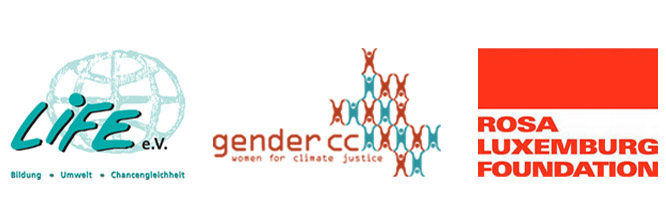
The project is a cooperation between GenderCC - Women for Climate Justice and LIFE e.V. It is supported by the Rosa Luxemburg Stiftung with funds of the Federal Ministry for Economic Cooperation and Development of the Federal Republic of Germany.


